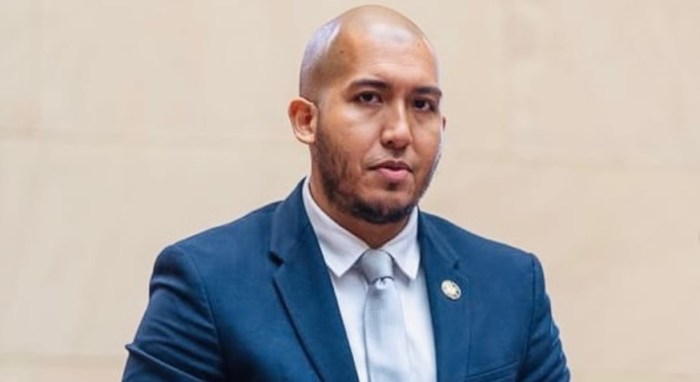By Thomas Tracy
He’s testified against his longtime friend and boss in the biggest political corruption case to hit the borough in the last 10 years. So, just what does Jeff Feldman, former executive director of the Kings County Democratic Party, do now? “I’m walking my shih-tzu,” Feldman said jokingly when surrounded by reporters after he testified against Clarence Norman for the prosecution in their coercion case against convicted former Assemblyman Clarence Norman. Weeks before his testimony on February 1, Feldman, who had been charged along with Norman for shaking down judicial candidates for thousands of dollars just before the 2002 primary, had stepped down from his post as Kings County Democratic Party’s executive director, a post he held before Norman became the party chair. When asked about his future plans, Feldman said that he had none, at least for now. “I suddenly realized that after 18 years of working with the Kings County Democratic Party, I hadn’t taken a sick day,” he said. “I figured that I’m entitled to two weeks before I consider my next step.” All criminal charges against Feldman were dropped with the understanding that he would be a witness for the prosecution. During his two-day testimony, Feldman explained that he was a messenger for Norman when he demanded that judicial candidates Karen Yellen and Marcia Sikowitz fork over more and more money to vendors the former legislator chose at campaign meetings. Feldman recalled on the stand the meeting when Norman allegedly blew his top at Yellen’s campaign manager, who did not want to pay the $10,000 for the “get out the vote campaign” in central Brooklyn. “He said to the effect, ‘If you don’t agree to this, you’re not going to have any support in this county,’” Feldman told prosecutors. But on cross examination, Feldman described Norman as a leader who gave his Democratic district leaders “more authority.” “The process was one of inclusion,” Feldman said, when asked to compare Norman’s regime to others that Feldman knew about during his career. “They [the district leaders] were the ones who provided the endorsement or lack of endorsement.” Feldman also helped bolster the defense’s point that there was an exceptional amount of pressure to win the 2002 civil court election, since two party picks “lost miserably” in 2001. “There had never been such a successful loss,” Feldman said describing the civil court race defeat before Yellen came up for reelection. “Do you ever remember when the party lost a judge race countywide two years in a row?” Norman’s attorney asked. “Not in 30 years,” Feldman said, adding, “If we lose the election, we’d lose power.” His statements resulted in a somewhat fierce series of re-direct questions by Assistant District Attorney Michael Vecchione. “If Norman went to the district leaders and said, ‘I don’t want you to support a certain candidate,’ what do you think are the chances of that candidate getting the endorsement?” Vecchione asked, laying the groundwork for his case that Norman would have made good on his threat if Yellen didn’t pay up. “It would be a virtual impossibility,” Feldman said. During an interview with reporters outside the courtroom, Feldman said that he spent most of his time on the stand “trying to remember what happened four years ago.” “You did not hear me not answer a question,” said Feldman, adding that although their eyes rarely met while he was on the stand, he does not think Norman’s holding any animosity towards him. “There’s no bad blood, at least not that I noticed,” he said. “I saw [Norman’s] father in the audience, and he greeted me warmly.” When asked, Feldman said that he wholeheartedly believed that Norman’s threat to Yellen constituted a crime. “I have a strong opinion about this,” he said, reminding reporters that just a few months ago, he was facing the same charges. “I pleaded not guilty,” he said.































